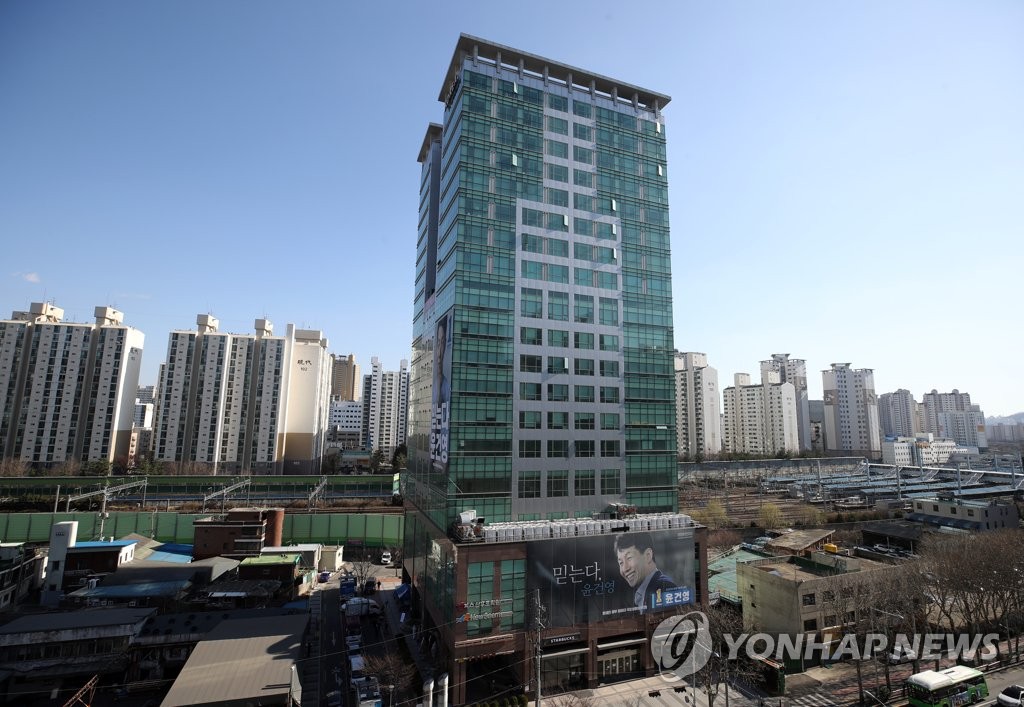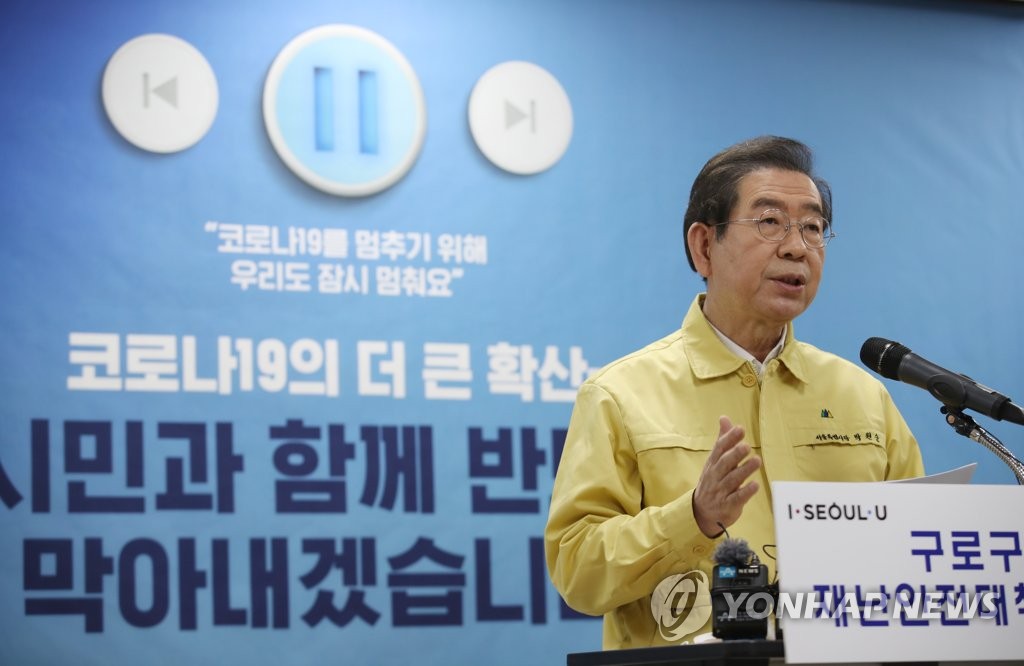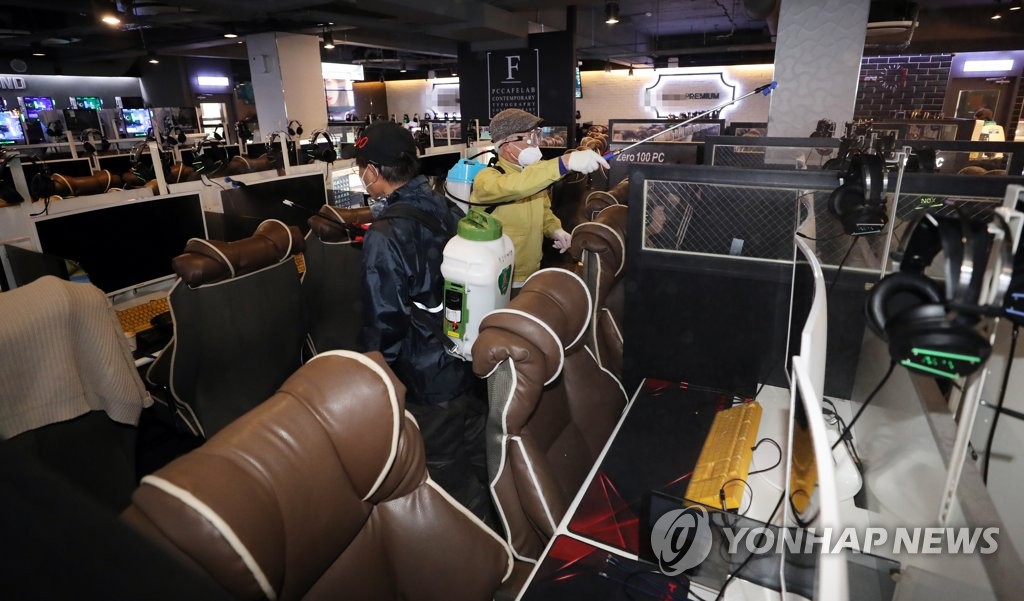- California Assembly OKs highest minimum wage in nation
- S. Korea unveils first graphic cigarette warnings
- US joins with South Korea, Japan in bid to deter North Korea
- LPGA golfer Chun In-gee finally back in action
- S. Korea won’t be top seed in final World Cup qualification round
- US men’s soccer misses 2nd straight Olympics
- US back on track in qualifying with 4-0 win over Guatemala
- High-intensity workout injuries spawn cottage industry
- CDC expands range of Zika mosquitoes into parts of Northeast
- Who knew? ‘The Walking Dead’ is helping families connect
Virus cases continue to increase in Seoul, but growth slows
New cases of the new coronavirus reported in Seoul on Friday slowed from earlier in the week, but officials said it is yet too early to lower their guard against the contagious virus.
“We seem to have extinguished the big fire, but we cannot lower our guard. … There is a possibility that (the call center infection) may emit sparks to other areas,” Park said in a press briefing streamed on YouTube.
South Korea reported 110 new COVID-19 cases Friday, bringing the total to 7,979, the Korea Centers for Disease Control and Prevention (KCDC) said.
In Seoul, where a group transmission at an insurance call center had spawned concerns, 13 more cases were reported, raising the total to 225 as of Thursday midnight, according to the KCDC data. An additional 15 cases have been reported by various ward offices in the city, bringing the total to 240, although they have yet to be reflected in the official daily government tally.



This photo, taken March 11, 2020, shows the Korea Building in southwestern Seoul, where group infections occurred among workers at a call center on the 11th floor. (Yonhap)
The increase marks a sharp slowdown from Wednesday, when 52 cases were reported following the call center infections. It is also smaller than the 19 new cases reported Thursday.
The call center case, which centers on a 19-story building in the southwestern ward of Guro, is so far the biggest cluster infection reported in South Korea’s capital of 10 million, or 25 million when including Incheon and Gyeonggi Province in the wider metropolitan area.
The building’s neighborhood is one of the busiest transportation hubs in southwestern Seoul — subway lines No. 1 and 2, which connect to nearby Incheon and Gyeonggi Province, pass through the area.
The call center is located on the 11th floor of the building. The lower 12 floors are leased out as offices and commercial facilities, including a wedding hall, and the top seven floors are residential.
Seoul Mayor Park Won-soon told reporters that most of the 1,091 workers, residents and their contacts in the affected building had been tested as of 10 a.m.
Of those who have been screened, 112 have tested positive, including 74 in Seoul, with others being discovered in Incheon, west of Seoul, and in Gyeonggi Province, according to local governments and the KDCD.
The cases have mostly been contained within the 11th floor of the building, and their family members, while no cases have been reported among residents who live on the 13th to 19th floor, Park said.
But he also warned that figures may go up when factoring in unregistered visitors at the building. The city is currently trying to secure a list of people who entered the building after Feb. 21 based on GPS tracking provided by mobile operators and the police.
In addition, Gwanak Ward, east of Guro, said six people who work at a venture startup company tested positive for the novel virus. The company, located near Seoul National University subway station, has 20 employees and occupies the eighth floor of an office building.
Local health officials said a 28-year-old man who recently visited Spain and the Czech Republic on business was confirmed to be infected on Thursday. This led to others being tested, with five more cases being confirmed earlier in the day. At present, some 35 people may have come into close contact with the man, although 11 have tested negative for COVID-19, with others still awaiting results or yet to be screened.
“The startup’s office has been closed and disinfected and places that the infected person visited are being sterilized,” an official for the ward said.
Health authorities have been on alert for additional group transmissions, with some 80 percent of all reported cases here beign traced to cluster infections in hospitals, religious facilities and even Zumba classes.
While the pace of daily new infections has shown signs of slowing following an aggressive testing program for more than 210,000 Shincheoji followers, who have been at the center of the outbreak here, sporadic outbreaks have been spotted across the country.
In Seoul, 14 cases were linked to Eunpyeong St. Mary’s Hospital in the northwestern Eunpyeong Ward, while another 13 cases were traced to an apartment complex in Seongdong Ward in the east of the city. Nine cases were recently reported in relation to a Protestant church in Dongdaemun Ward that held a winter camp in late February.
Closed, indoor spaces, such as call centers, internet cafes and private-sector cram schools, have emerged as spaces carrying a greater risk of infection for users, with the government stressing social distancing and recommending owners suspend their businesses.











